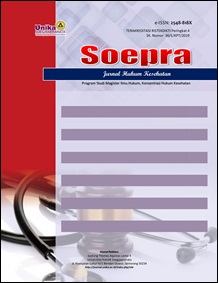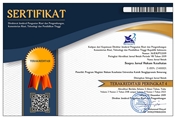Midwife’s Role in The Implementation of The Health Minister’s Regulation Number 66 of 2014 Through Stimulation, Early Detection and Intervention Activities to Child’s Growth Disruption at Public Health Centers of Yogyakarta City
Abstract
However, many children with special needs were factually ignored by their families even they
were often considered as family’s disgrace. The government, through midwives, could play a
role in minimising the risks experienced by children with special needs by doing stimulation,
early detection and intervention to child’s growth disruption.
This research usedsocio‐legal approach with the analytical‐descriptive specification. Primary
data were obtained from interviews with Head of Health Centers (Puskesmas) of Mergangsan,
Jetis and Tegalrejo beside with midwives, integrated service post (posyandu) cadres, and five
parents of children with special needs. Secondary data were obtained from books and legal
materials related to the research. The data were then qualitatively analysed.
The results showed that the three Health Centers (Puskesmas), namelyMergangsan, Jetis and
Tegalrejo, had implemented the Health Minister’s Regulation Nr. 66 of 2014. The Health
Centers had programs having relations with child’s growth that was SDIDTK (stimulation, early
detection and intervention of growth disruption). Midwives had performed their roles in
stimulation, early detection and intervention of growth disruption thorough examination that
was monthly conducted together with posyandu’s activities at the Health Centers.
Supporting factors of the monitoring implementation of a child’s growth, development and
development disruption included health care facilities, adequate human resources (health
workers), affordable posyandu’s costs and cross‐sectorial cooperation. The inhibiting factors
were low‐income family’s supports, unfavourable social and economic conditions and mother's
knowledge that remained poor.
Keywords
Full Text:
PDFReferences
Abdul Qodir Shaleh, 2008, Panduan Lengkap Mendeteksi, Memahami dan Mengatasi Masalah-Masalah Kesehatan Anak secara Medis dan Psikologis, Diva Press, Yogyakarta.
Afin Murtir, 2014, All About Kesehatan Anak, Trans Idea Publishing, Yogyakarta.
Anik Maryunani, 2012, Ilmu Kesehatan Anak dalam Kebidanan, CV. Trans Info Media, Jakarta.
Cecep Triwibowo, 2014, Etika dan Hukum Kesehatan, Nuha Medika, Yogyakarta.
Eko Suryani dan Atik Badi’ah, Asuhan Keperawatan Anak Sehat dan Berkebutuhan Khusus, Pustaka Baru Press, Yogyakarta.
Kementrian Kesehatan RI, 2010, Pedoman Umum Perlindungan Kesehatan Anak Berkebutuhan Khusus.
Maria Ulfa, 2015, Beragam Gangguan Paling Sering Menyerang Anak, FlashBooks, Yogyakarta, Aulia Fadhli, 2010, Buku Pintar Kesehatan Anak, Pustaka Anggrek, Yogyakarta.
Marmi dan Kukuh Rahardjo, 2014, Asuhan Neonatus, Bayi, Balita dan Anak Prasekolah, Pustaka Pelajar, Yogyakarta.
Undang-Undang Dasar 1945
Undang-Undang Nomor 23 Tahun 2002 tentang Perlindungan Anak
Undang-Undang Nomor 36 Tahun 2009 tentang Kesehatan
Permenkes Nomor 369 Tahun 2007 tentang Standar Profesi Bidan
Permenkes Nomor 66 Tahun 2014 tentang Pemantauan Pertumbuhan, Perkembangan dan Gangguan Tumbuh Kembang Anak
DOI: https://doi.org/10.24167/shk.v5i1.1500
Refbacks
- There are currently no refbacks.
Copyright (c) 2019 SOEPRA







